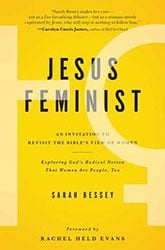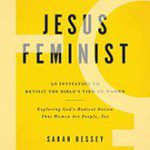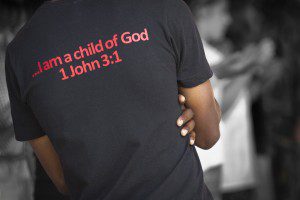“When else in the world would anybody have cared about what some happy clappy mum from western Canada thinks about the church and faith and scripture and theology? Uh, never, absolutely never.”
That’s author and blogger Sarah Bessey, responding to my comment about the rise in popularity of a growing number of young women authors, such as herself, in the Christian media landscape of late. A rise, she imagines as we talk further, that’s due in part to our being in what religious historian Phyllis Tickle refers to as “The Age of the Spirit” (the Spirit being a particularly feminine expression of the Holy), combined with a new meritocracy in the media and the blogosphere in particular, in which voices typically on the margins have found a platform for their voice, and are finally being heard.
 And heard they are … Bessey is an award-winning blogger who’s attracted a passionate and devoted subscriber list and whose book, Jesus Feminist, has captured the attention of women and men alike, across a diverse theological spectrum.
And heard they are … Bessey is an award-winning blogger who’s attracted a passionate and devoted subscriber list and whose book, Jesus Feminist, has captured the attention of women and men alike, across a diverse theological spectrum.
I first met Sarah at this year’s Christianity 21 conference here in Denver, where she immediately won over the crowd with her simple and tear-filled opening words: “I love Jesus.” I spoke with her at length again this week about what being a Jesus Feminist means for her. Here are a few excerpts from our Skype call; our entire video conversation follows this interview, below.
Let’s just start with the title of your book, guaranteed to raise just a few eyebrows. What is a Jesus Feminist?
It’s funny, because it’s a completely made-up term. It really grew organically out of some conversations I was having as I was re-orienting my life around who Jesus was and his teachings and ministry, and how that connected with a lot of my passions for women and women’s issues around the world. And I just began very easily calling myself a feminist. And people would raise an eyebrow and ask “Well, what kind of feminist are you?” And I would shrug and say “Well, I’m a Jesus Feminist.” It just means I’m a feminist precisely because I love Jesus and because I’m following him and orienting my life around him.
So what does it mean to you to be a Jesus Feminist? What’s the particular kind of feminism that Jesus evokes for you?
I guess for me, it really comes down to this radical notion that women are people. Which of course, shouldn’t be so radical. From my context, where I grew up, I felt like I’d lived on the other side of the debates that a lot of the church in certain parts of the country are still having about women — whether it’s about women in ministry or leadership, or whether it’s about marriage. I grew up on the other side, where the answers were: “Absolutely, the gifts of the spirit aren’t gender-based,” “Absolutely, this is how marriage is supposed to look.” So that was my baseline; it wasn’t anything I had to re-learn in. But when I discovered there were people who didn’t agree with me, and that thought differently, I wanted to re-evaluate it, re-look at it, and make sure I was really following Jesus.
So I spent more and more time with the gospels … and I looked at who Jesus was and how he interacted with women throughout scripture, and even into Paul and into the early church … and I just saw that it was so normal. There wasn’t any “This is what women do,” or “This is what men do.” There was just us, standing before him as the story happened. It didn’t matter whether you were male or female, you were engaged by Jesus as worthwhile. And I liked that.
In Chapter One, you say: “Patriarchy is not God’s dream for humanity.” This has been a topic of debate of late within more conservative Chrisitans circles, and indeed, Christians have been arguing about gender roles for centuries. How did you arrive at this conclusion, despite specific biblical verses that might suggest otherwise, that patriarchy isn’t God’s dream for us?
I don’t think patriarchy is God’s dream for humanity. Right at Creation I think we see what God intended for humanity, and I think that patriarchy was a result of the fall. Then I think we see through the redemptive movement of God throughout scripture showing He works with who He’s got and with what He’s got, in the seasons He’s got, to move us further along on His arc towards justice, towards what we see with the Kingdom of God … which Jesus says is already among us … and is what we are meant to be living within.
So when I look at God’s creation and what God’s intended purpose was for people, I’ve come to the conclusion that “biblical womanhood” is really no different than biblical personhood. Women aren’t restricted to 3% of scripture that specifically says “wives and mothers” — there are a lot of women who aren’t wives and mothers. So when I look at that, I see that the whole of scripture is for us. And if we look at where God is moving us and what the Kingdom of Heaven looks like, I think we really need to ask ourselves as citizens of that Kingdom, what world are we prophesying? And what is the outpost that we are setting up with our lives to show what the Kingdom of God would look like? And I don’t believe that patriarchy is it. Now, I don’t believe the alternative of that is matriarchy … but I think it looks like something that is very whole and beautiful and affirms both.
Your book has been praised by conservative evangelicals to liberal feminist theologians alike … what do you think it is about your message that’s resonating across these theological and cultural divides?
I think it has to do with the power of story. I call a lot of what I write narrative theology. I write abut what I think and experience and know about God, and the best way I know how to do that as a writer is by story-telling. It’s really easy to proof-text each other into corners, until everybody is one big reaction… but when you feel like you’re sitting across from somebody and hearing their story, and understanding the context for what they think…
I think it was Frederick Buechner who said that all theology has its roots in autobiography. We’re not just talking about issues.We’re talking about people. We’re talking about women, and pastors, and teachers, and leaders, and mothers. These are issues to be debated. These are lives.
I joke sometimes that I’m too liberal for the conservatives and conservative for the liberals, and usually when someone is just about to bail on me, they’ll hear something where they say, “Oh ok, maybe I’ll stay with you for a while longer.” I think I make room for everybody. I’m still figuring out who I am half the time, so you have to be able to hold some space for the qeustions and the mystery too, and the not-figuring-it-out.
And I think that there’s something in the book that makes all of us realize that this is something that we yearn for. That we do want to know that God sees us this way. That we are loved. That we are free. That we are whole. That there is healing and redemption and that this is what the Kingdom of God looks like. I think there’s always some part of our soul that reads that or hears that and begins to understand what God’s dream is for who we are as a people, and that says “Oh God, I want that,” no matter where we land on the spectrum. And I think that’s quite universal.
Listen to the rest of my conversation with Sarah Bessey below. And to read an excerpt from her book, visit the Patheos Book Club here.
http://www.youtube.com/watch?v=3-jsv03hb6M












